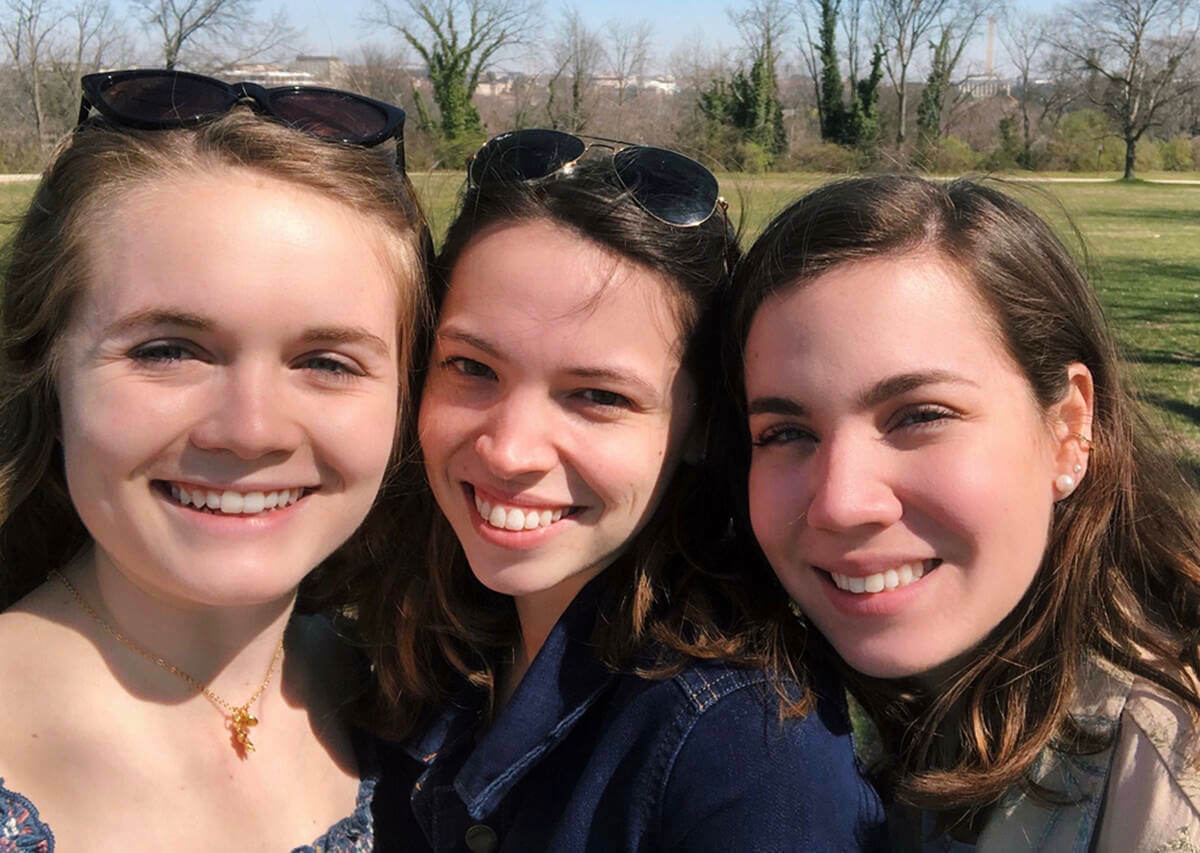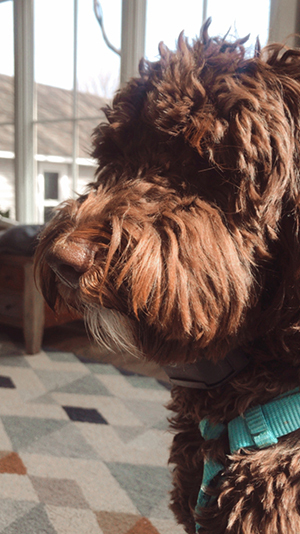- Student COVID Stories: What We Did “Here”
- “Many Tests, Never a Final,” Indonesia Brown ’22
- “40,000 Steps,” José Sánchez Córdova
- “The Distance Between Us,” Alysa Guffey
- “Off Course,” Jessica Meyers
- “Lockdown’s Life Lessons,” Veronica Navarro
- “What I Carried Home,” Adriana Pérez ’22
One of the first things I did was buy two pairs of sweatpants. I didn’t have enough clothes for two weeks in the carry-on bag I had packed for spring break, I rationalized.
I didn’t know, at the time, that those two weeks would drag on for two months, and that I would need more than comfy clothes to get me through them.
My friends and I were visiting one of their families in Arlington, Virginia, during that fateful spring break in 2020. We had just been out for brunch in downtown D.C., and had decided to take a stroll to digest some of the best avocado toast I’ve ever had.
The brisk spring air blew through my hair as I held my phone, scrolling through Twitter. “The World Health Organization just declared COVID-19 a pandemic,” I announced to Abby and Isabel. A chilling realization.
We walked in silence for a few blocks. Then, an email from Notre Dame popped up among our many phone notifications. Classes were going online for the next two weeks.
We stopped, looked around. We realized we were lost, the gray concrete of the Immigration and Customs Enforcement Building looming tall next to us. What now?
That night, Abby decided she would return to her hometown in Alabama the next day to be with her family. I didn’t want to go back home to Ecuador those two weeks, as I considered the very real possibility of international flights getting canceled and ultimately being stuck in another country for the remainder of the semester if the pandemic subsided quickly. What ingenuity.
Isabel’s parents then FaceTimed mine (it was the first time they met), telling them I could stay at their house in Arlington as long as I needed. And I would need it: three days later, the university decided to go online for the rest of the semester just as Ecuador canceled all incoming flights.

Those next two months are etched bittersweetly in my memory. I didn’t get to have the typical quarantine experience with my family that many of my peers did — no tensions with family, no making dalgona coffee with Dad, no baking bread with Mom, no watching Tiger King with my brothers.
My days were organized around virtual classes and — happily — around the warm, homemade dinners Isabel’s mom prepared that put the dining halls to shame. And as her family gathered around the table, I was one of them. I would take the seat of their dog, Pippa, who would then spend the entire meal strutting around the table, begging for food and barking at me.

Pippa and I had a complicated relationship. She acted like a small human — and, honestly? — it pissed me off. She would come up to me, stand on her hind legs and stretch on me by putting her front legs on my stomach. She had no regard for personal space.
Some nights, I could hear Isabel giggling as she brought Pippa upstairs to sleep in the room with us. She knew how exasperated I’d get. And for good reason: the dog peed on our bed once and spilled sparkling water another time. She would then wake me up by getting on the bed when she wanted to be let out — a small, dark figure jumping onto my bed when the lights were off and I was in the middle of a dream.
Isabel’s parents would often ask me if I wanted to take Pippa on walks or if I wanted to go on a hike. I declined most of the time. I think they were worried I was depressed. But I was fine, and to be fair, we still didn’t totally know how the virus spread, so I wasn’t taking any chances.
I turned 21 that April, far away from home, my two brothers — I’m a triplet — also scattered around the United States in Houston and Chicago. It was the first birthday I have ever celebrated away from everyone in my family, given that one of my brothers attends Notre Dame too. I didn’t mind it, though. Weirdly, it was the first birthday that felt truly mine.
One of my brothers texted me happy birthday that morning, and I thanked him, fully forgetting that it was his birthday too for, like, three minutes. “Hahaha I just realized I didn’t say happy birthday back to you,” I texted back.
After a video call with my family, I went down for dinner. Isabel’s dad had made us margaritas and her sister had baked a tres leches as my birthday cake. Being out of practice, I got drunk off of two sips of the drink. The smooth, moist texture of the dessert reminded me of the sweetness of home. I went upstairs with a barriga llena, corazón contento. A full stomach, a happy heart.
Isabel showed me a video my friends and family had put together sharing their favorite things about me. The gesture made me cry so hard that Isabel’s mom came up to check on my sobbing.
After online classes ended, I would wake up after noon to the sound of chirping birds and the smell of baked oatmeal. Isabel would sometimes have gone out for a coffee run, and an iced vanilla latte would be waiting for me on the kitchen counter.
At night, we’d watch one of many then-popular Netflix shows — Outer Banks, Lovesick, Never Have I Ever — with the windows to our room open, the warm summer breeze wafting through, as we painted our nails on the floor.
I cried so hard when I couldn’t find COVID-19 tests near us that’d have results ready in 24 hours, which Ecuador required once flights reopened. A cardinal flew by and perched on a nearby branch as I sat on the porch, a chill in my spine. I would be stuck here for longer. I missed my family. Isabel’s mom assured me everything would be alright: that cardinal was probably her father, imparting the same message, she said.
I was able to return home in June with more than a carry-on in tow. With the rest of that semester, my life at Notre Dame, my friendships, my tears, the bittersweet quarantine memories, all packed up in two suitcases. And myself, both ready and unprepared to face three months of quarantine with my family for the first time.
Adriana Pérez, the editor-in-chief of The Observer in 2021-22, will be a Chicago Tribune intern this summer.